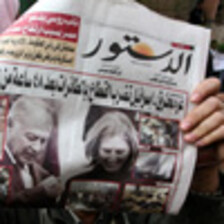Gaza Strip 23 June 2008

Palestinians in Gaza City enjoy the Mediterranean shore on the second day of ceasefire, 20 June 2008. (Wissam Nassar/MaanImages)
The main Palestinian political factions in Gaza agreed last week to an Egyptian-mediated ceasefire between Israel and the ruling Hamas party. According to Hamas officials in Gaza, the truce will lead to a gradual ease of the one-year-old Israeli blockade on Gaza as well as a halt to Israeli army attacks on the coastal territory. In return, Palestinian factions will commit to ceasing all homemade rocket fire from Gaza onto nearby Israeli towns for a period of six months. In addition, Palestinians and Israelis will start negotiating over the release of a captured Israeli soldier, Gilad Shalit, and the reopening of Gaza’s border crossings, including the Rafah Terminal, the main outlet to the outside world for Gaza’s population.
How long the ceasefire will hold is dependent on Israeli and Palestinian actions. However, based on the reactions of Palestinians across all levels of society to the ceasefire agreement, the possibility of sustaining the truce appears doubtful. On the streets of Gaza City, interviews with a number of residents revealed a mixture of pessimism and optimism.
Abu Fayez, 58, said that “I am hopeful that this ceasefire will sustain so that the people can be relieved of such a strangulating siege and people find a way to earn a living. However, I am doubtful about this.”
University student Mahmoud Hamdan, 22, echoed these sentiments, stating that “We look forward to a better situation, especially after a year of blockade, which burdened us heavily. But I doubt that the Israelis are concerned about a tahdiyya [truce].”
On Thursday 19 June, the first day of the truce, a Hamas statement, posted on the organization’s website, Palestine Information Center, stated that the Israeli army opened fire toward the city of Khan Younis in southern Gaza. In addition, it reported that Israeli gunboats fired at Palestinian fishing boats on the southern shores of Rafah city.
Meanwhile, other Palestinian factions in Gaza have their own reservations about the ceasefire deal. The Popular Front for the Liberation of Palestine stated on Thursday that unless the Israeli occupation ends, this ceasefire can not hold.
Dr. Amer Ibrahim, a political analyst on Israeli affairs, said “the Palestinian factions’ agreement to the ceasefire, despite some reservations, will help this truce hold. However, if Israel delays, within two weeks, the reopening of the Gaza border crossings, the ceasefire will be vulnerable to collapse.”
According to Dr. Ibrahim, Israel finally accepted the ceasefire after prolonged Egyptian mediation efforts for two reasons: “First, Israeli fear that any major attack on Gaza will lead to the death of Shalit. Second, Israeli Prime Minister Ehud Olmert is heading for upcoming elections. Therefore, high causalities and failure of the army to completely defeat Hamas, as happened [with Hizballah] in the last war in Lebanon, might lead to Olmert’s defeat [in the election]!”
Mohammad al-Baba, a political leader of the Popular Resistance Committee in Gaza, took part in the Cairo talks and maintained that his group will not obstruct implementation of the ceasefire, but he warned of likely Israeli procrastination in reopening Gaza’s crossings. He stated that “I believe that the fate of the crossings is still in the hands of Israel. However, we will do our best to ensure implementation of the ceasefire if Israel commits to reopening Gaza’s crossings.”
While many international players welcomed the ceasefire agreement, hoping this would lead to a more comprehensive peace agreement between the parties, Israel’s political leadership gave mixed signals. Olmert, who signed the deal jointly with Defense Minister and political rival, Ehud Barak, himself cast doubt over sustainability of the agreement, stating that “this is a shaky truce and cannot last long.” He also asserted that his army is preparing for a possible attack on Gaza.
Will the truce collapse or will the “battered” Gaza Strip have the first chance in a year to be relieved of a crippling Israeli blockade? This question will be determined by how the parties implement their mutual obligations. Meanwhile, Rana, a 22-year-old university student said, “God willing, this time the ceasefire works and we can breathe some kind of relief.”
Rami Almeghari is contributor to The Electronic Intifada, IMEMC.org and Free Speech Radio News. Rami is also a former senior English translator at and editor-in-chief of the international press center of the Gaza-based Palestinian Information Service. He can be contacted at rami_almeghari A T hotmail D O T com.
Related Links





